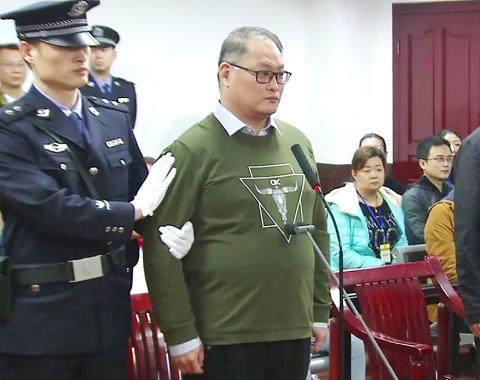Taiwan yesterday condemned the conviction of Taiwanese human rights advocate Lee Ming-che (李明哲) by a Chinese court, saying it is “unacceptable” that Lee should be found guilty of state subversion for advocating democracy and freedom.
“The nation cannot accept that Lee Ming-che has been convicted of such a crime as state subversion for sharing the ideas of democracy and freedom,” Presidential Office spokesman Alex Huang (黃重諺) said, calling for Lee’s immediate release.
Lee’s case has greatly damaged cross-strait relations and threatened Taiwanese belief in freedom and democracy, Huang said.

Photo: AFP / Yueyang Intermediate People’s Court
The Mainland Affairs Council also condemned the verdict, saying Lee’s online exchanges with his Chinese friends were an innocent effort to share Taiwan’s democratic experience, which did not compromise China’s safety and security in any way.
It was also unacceptable that former Democratic Progressive Party (DPP) legislator Wang Li-ping (王麗萍), who accompanied Lee’s wife, Lee Ching-yu (李凈瑜), to Yueyang, Hunan Province, to hear the verdict, was denied entry and deported, the council said.
China should ensure the safety of Lee Ching-yu and members of her group and their return to Taiwan, the council said.
It should also ensure Lee Ming-che’s health and right to family visits during his confinement, it said, adding that the government would continue its efforts to seek his return.
Politicians across party lines also condemned the verdict and urged the government to safeguard the rights of Taiwanese.
“There should not be, and could not possibly be, political prisoners in a truly democratic, free and law-observing country,” the DPP said in a statement.
The verdict “indicates China’s indifference to the universal values of democracy and human rights, and damages its international reputation, while hurting the feeling of Taiwanese,” the DPP said.
Beijing should respect Taiwan’s belief in democracy and freedom, as Chinese President Xi Jinping (習近平) said during the Chinese Communist Party’s (CCP) 19th National Congress last month, the DPP said.
The Chinese Nationalist Party (KMT) said the council needs to step in wherever Lee Ming-che’s rights are compromised during and after the trial, even though cross-strait relations and communication have cooled since the DPP administration took office.
The DPP administration would be sacrificing people’s rights for its ideology if it fails to communicate with Beijing over Lee’s condition, KMT spokesman Hung Meng-kai (洪孟楷) said.
The New Power Party (NPP) urged the government to take a tougher stance against China as cross-strait agreements are ineffective in Lee’s case, and passivity would only compromise personal freedom and the freedom of expression of Taiwanese.
Lee Ming-che is innocent and the Chinese government is guilty of illegally detaining him, violating human rights and cracking down on political dissidents, the NPP said.

‘TAIWAN-FRIENDLY’: The last time the Web site fact sheet removed the lines on the US not supporting Taiwanese independence was during the Biden administration in 2022 The US Department of State has removed a statement on its Web site that it does not support Taiwanese independence, among changes that the Taiwanese government praised yesterday as supporting Taiwan. The Taiwan-US relations fact sheet, produced by the department’s Bureau of East Asian and Pacific Affairs, previously stated that the US opposes “any unilateral changes to the status quo from either side; we do not support Taiwan independence; and we expect cross-strait differences to be resolved by peaceful means.” In the updated version published on Thursday, the line stating that the US does not support Taiwanese independence had been removed. The updated

‘CORRECT IDENTIFICATION’: Beginning in May, Taiwanese married to Japanese can register their home country as Taiwan in their spouse’s family record, ‘Nikkei Asia’ said The government yesterday thanked Japan for revising rules that would allow Taiwanese nationals married to Japanese citizens to list their home country as “Taiwan” in the official family record database. At present, Taiwanese have to select “China.” Minister of Foreign Affairs Lin Chia-lung (林佳龍) said the new rule, set to be implemented in May, would now “correctly” identify Taiwanese in Japan and help protect their rights, the Ministry of Foreign Affairs said in a statement. The statement was released after Nikkei Asia reported the new policy earlier yesterday. The name and nationality of a non-Japanese person marrying a Japanese national is added to the

AT RISK: The council reiterated that people should seriously consider the necessity of visiting China, after Beijing passed 22 guidelines to punish ‘die-hard’ separatists The Mainland Affairs Council (MAC) has since Jan. 1 last year received 65 petitions regarding Taiwanese who were interrogated or detained in China, MAC Minister Chiu Chui-cheng (邱垂正) said yesterday. Fifty-two either went missing or had their personal freedoms restricted, with some put in criminal detention, while 13 were interrogated and temporarily detained, he said in a radio interview. On June 21 last year, China announced 22 guidelines to punish “die-hard Taiwanese independence separatists,” allowing Chinese courts to try people in absentia. The guidelines are uncivilized and inhumane, allowing Beijing to seize assets and issue the death penalty, with no regard for potential

‘UNITED FRONT’ FRONTS: Barring contact with Huaqiao and Jinan universities is needed to stop China targeting Taiwanese students, the education minister said Taiwan has blacklisted two Chinese universities from conducting academic exchange programs in the nation after reports that the institutes are arms of Beijing’s United Front Work Department, Minister of Education Cheng Ying-yao (鄭英耀) said in an exclusive interview with the Chinese-language Liberty Times (the Taipei Times’ sister paper) published yesterday. China’s Huaqiao University in Xiamen and Quanzhou, as well as Jinan University in Guangzhou, which have 600 and 1,500 Taiwanese on their rolls respectively, are under direct control of the Chinese government’s political warfare branch, Cheng said, citing reports by national security officials. A comprehensive ban on Taiwanese institutions collaborating or